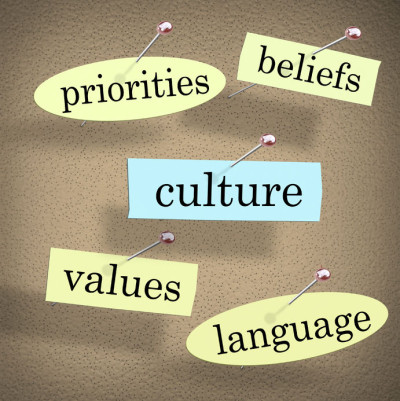Listen to the blogcast!
………………………….
Lately, I have been doing a lot of thinking about the importance of culture to PLEDGEtalk. I am excited about what is to come–it promises to bring a whole new level of health to our relationships! Webster defines culture as: “the customary beliefs, social forms, and material traits of a racial, religious, or social group.” Also: ‘the set of shared attitudes, values, goals, and practices that characterizes an institution or organization.”
Let’s take that a part some:
What customary beliefs do you hold about relationships?
- Are relationships supremely important to you or only nominally?
- Do you believe relationships just happen, or do you intentionally work to build them?
- What relationships are most important to you and why?
What about the social forms in your marriage or family?
- Does everyone feel equally valued, whether they be male or female, adult or child, young or old?
- When you speak to a child, do you ask him to look up to you, or do you kneel down to look at him at eye level?
- Is time spent together in work and play, or more in one or the other?
And how about the shared attitudes, values, goals, and practices of your home, your church, or in your workplace–what are they?
- Is it ok to feel? How about showing feelings – what is ok and what is not?
- Is every comment or question seen as important? How is that made evident?
- Who does what? How is that decided?
- Is there a detailed picture in everyone’s mind about the type of interactions that are expected in the group?
It is highly likely that you and I have thought about questions such as these at least on a sub-conscious level. It is far less likely that we have considered answers to these and other questions in an effort to deliberately build a healthy culture in the relationships we value. If we were to do so, the potential for positive impact is unending!
Interestingly, each of us has a sense of what we want to experience in our relationships.
Rarely, however, have we defined for ourselves–let alone to others–what we want those experiences to be. Stop and think with me. There are various sets of relationships we might have in life: a marriage, a family, an exercise group, a committee, or team at work. What do you like or dislike about any of the groups you are a part of? Answering that will begin to help you define the kind of culture you most want in your relationships.
Remember the saying, “everything you need in life you learn in Kindergarten?” My daughter who teaches Kindergarten works hard to live up to that claim. One of the most important values she brings to her classroom is to create a culture where everyone learns to love each other well. Each year she creates a social contract discussing with her children:
- How do you want me (the teacher) to treat you?
- Here’s how I (the teacher) would like you to treat me.
- How do we want to treat each other?
My daughter is teaching her children about culture in a group setting and training them how to live out that culture in a way that would benefit all.
Think about the impact this is having on each of these children’s lives–for the rest of their lives! Each child is being taught about the value of relationships and the positive difference they can make in a group by the ways in which they relate to each other!
Imagine five-year-olds who are learning what we need to be learning as adults! What difference would it make if time was spent in our marriages or around the family dinner table, or in a team meeting or small group asking similar “social contract” questions of each other? Imagine the difference if we not only heard what each person values in relationships, but we all sought to live those values out with each other. It is huge!
Ok, there is more I will be sharing in future posts, but for now, take some time to reflect on what I have written above.
- What do you like or dislike about the groups which you are in currently?
- Describe the ideal relational culture you would like to experience?
- What is one thing you will do to start creating that culture? Share it with us all below so we can learn this together!!!
Photo Copyright: iqoncept / 123RF Stock Photo




When I think about the “culture” that I create when I relate to others, family, friends, etc. I have to try real hard to think in terms of Jesus example and how he related to others. The difficulty for us (since we aren’t Jesus) is that relational dynamics change so quickly. The culture that we create when interacting with others can change in the blink of an eye based on verbal or non-verbal cues.
When I enter a room, I am secretly thinking, “how well do I know this person”. In the case of my wife of 26 yrs. I still have to ask that question on some level so that I do not respond to her in ways that limit her ability to relate a new experience, or share a new feeling, thought, or insight. Just because I know her doesn’t give me license to relate to her in ways that hinder her heart.
I believe that was part of Christ’s success in getting people to open up to him and share whatever that person needed to share, good, bad, etc. was His ability to listen until He knew the person’s heart.
Thanks for your honesty Ed. I appreciate your desire to guard what you say so as to not hinder the heart of your wife. And like you said, there’s no better example of a person who creates a culture than Christ!